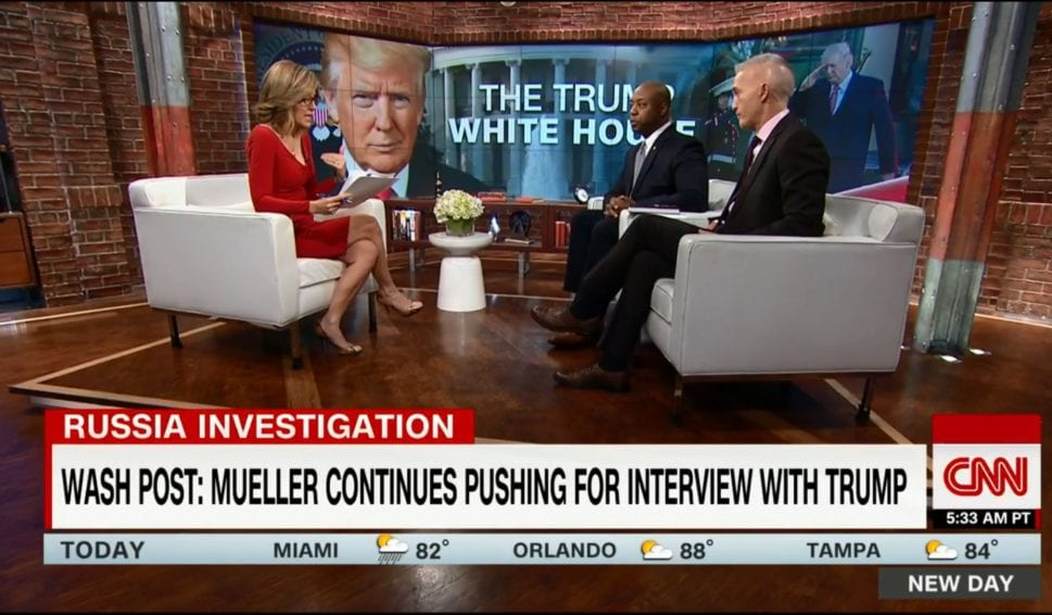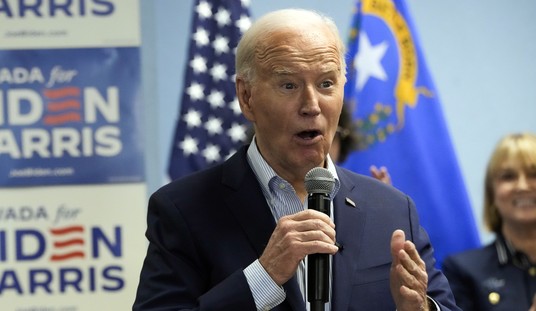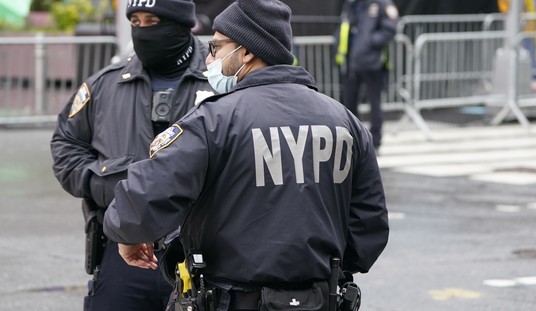
Yesterday word leaked from the special counsel that President Trump had been told that he’s not a “criminal target” and that the special counsel wants to interview him:
Special counsel Robert S. Mueller III informed President Trump’s attorneys last month that he is continuing to investigate the president but does not consider him a criminal target at this point, according to three people familiar with the discussions.
In private negotiations in early March about a possible presidential interview, Mueller described Trump as a subject of his investigation into Russia’s interference in the 2016 election. Prosecutors view someone as a subject when that person has engaged in conduct that is under investigation but there is not sufficient evidence to bring charges.
The special counsel also told Trump’s lawyers that he is preparing a report about the president’s actions while in office and potential obstruction of justice, according to two people with knowledge of the conversations.
Mueller reiterated the need to interview Trump — both to understand whether he had any corrupt intent to thwart the Russia investigation and to complete this portion of his probe, the people said.
— ProfanityLadenTweetsHat (@Popehat) April 4, 2018
This is just bullsh** on a lot of levels. If Trump were a target then Mueller would have sent a “target letter” by now notifying him of his status and he would have to be Mirandized before anyone from Mueller’s office could talk to him. The fact that they are asking him to talk to them is a sign they have no intention of trying to violate Department of Justice regulations and have a grand jury subpoena issued but neither are they ready to let go of being the last best hope of the #Resistance.
Reportedly, Trump’s team is divided between those who think he should talk to Mueller so he can “put this behind him,” and people with legal experience who are screaming, “WHAT ARE YOU FREAKIN’ THINKING?”
This morning one of my favorite members of Congress, Trey Gowdy, appeared on CNN to discuss this story:
Rep. Trey Gowdy says he thinks President Trump should talk with special counsel Robert Mueller: "If you have nothing to hide … sit down and tell him what you know" https://t.co/o9VF7cWPCn https://t.co/4KxX6rdjKD
— CNN Politics (@CNNPolitics) April 4, 2018
“Nothing to hide?” Seriously?
This is quite possibly the worst legal advice ever offered to anyone by an actual lawyer since the very first lawyer trod the Earth. It is so far beyond bad that one can easily believe that Gowdy is trying to bait Trump into an interview.
There are a lot of very good reasons that Trump should tell Mueller to kiss his butt and ignore the request. The main one is that it is very obvious that literally everyone Mueller’s people talk to is actually a target and the only reason Mueller wants to talk to Trump is to damage him. Just remember that, like Russia, the cop asking to interview you is not your friend. Just as there are lots of reason to not to talk to Mueller there are zero reasons to talk to him. First and foremost because, as the saying goes, no one has ever talked himself out of being charged with a crime but a lot of people have talked themselves into being charged with one. An attorney with a client as personally undisciplined as Trump should not allow him in the same ZIP Code with Mueller. The next great reason is that Mueller is out to collect scalps. Period. Yesterday’s sentencing of Alex van der Zwaan in which he received a 30-day sentence shows there is literally no offense too small for Mueller to indict and prosecute.
This is from a white-collar criminal defense firm:
All individuals coming into the orbit of the federal prosecutor and grand jury fall into one of three categories: witness, subject or target. It is crucial to understand your status in a federal investigation to make the right decisions.
• Witness: Being a witness in a case involving the FBI, Secret Service, IRS or other Federal Agency does not necessarily mean that you observed or saw a crime happen. You may have information that law enforcement believes might be relevant in a criminal investigation to help prove either the guilt or the innocence of another individual or business. Although you may only be a witness, it’s critical to recognize that if you speak to Federal law enforcement your words are not protected without a proffer agreement and should you make a misrepresentation, you can be charged with the crimes of Lying to a Federal Agent[1] and Obstruction of Justice, each of which is punishable by as much as five years in a Federal penitentiary
• Subject of an Investigation: The term “subject of an investigation” has a particular meaning within the United States Department of Justice (DOJ). According to the DOJ Handbook[2], a “subject” is: “a person whose conduct is within the scope of a Grand Jury’s investigation.” A subject is somewhere between a target and a witness. A subject has engaged in conduct that may look suspicious or unethical, but the prosecutor isn’t certain that a provable crime has been committed and wants to do more investigating in order to be sure.
• Target: The term “target of an investigation” is also specifically defined by the DOJ. A person is a target where the prosecutor or Grand Jury has substantial evidence linking him to the commission of a crime. Designation as a target provides a clear warning of a person’s criminal exposure.
Even though your status as a witness, subject or target may be important in guiding your strategy during a particular phase of a federal white collar crime investigation, the key thing to remember about these categories is that they are ultimately meaningless and offer you no protection. Why? Because even if you’re currently a witness or subject, there’s no guarantee that your status will remain unchanged. It is necessary, therefore, from the outset of a white collar crime investigation, to base any strategy on a realistic assessment of your potential criminal exposure after consulting with an experienced federal crime defense lawyer.
Never Submit to an Interview Without Legal Representation
Even assuming your absolute innocence of the wrongdoing being investigated, the federal law enforcement agent has had the luxury of minutely studying all of the relevant paperwork surrounding that investigation. You, on the other hand, may not have thought about the subject matter, much less the underlying details, and you will probably not be shown any of the pertinent documents before the interview begins.
You could easily make factual mistakes during your interview. What happens then? Maybe nothing, if you are dealing with an experienced agent who believes that you are trying to tell the truth. But if the agent is inexperienced and unsure of your culpability or if you are not confirming his version of events, your mistakes can easily be interpreted as intentional falsehoods under federal law. Usually, the safest course of action in these situations is to politely tell the agents that although you want to be helpful and cooperate, you have an attorney, or are in the process of hiring a lawyer and that you are not going to discuss anything with them before consulting with an attorney. In order to protect yourself, assume the worst case scenario and remain silent.
Conduct that you considered to be completely acceptable when you engaged in it may now be thought of as wrongful by the government. Remember, many federal white collar crimes do not require the government to prove that you knew you were violating the law. If you admit to the conduct, you may be admitting to the crime. It is ill-advised, therefore, to speak with a federal agent or prosecutor, or respond to a grand jury subpoena, without first discussing your case with an experienced federal white collar criminal defense lawyer.
And if you do have representation, shut up.
Keep in mind that the suspect(target)/subject line is theoretical. During my tour as an IG investigator, I routinely told people that they were subjects…and explained, nicely, how that was just a formality…when I knew in my heart they were suspects simply because Mirandizing a suspect tends to make them shut up. Subjects feel they have nothing to hide and want to clear the matter up. If you have doubts, just remember that Flynn, Papadopoulos, and van der Zwaan all started out as witnesses and ended up charged with felonies.
Back several years ago when I watched network television, one of my favorite shows was the David Simon series, Homicide: Life on the Streets. Here in Season 1, Episode 1, you have veteran homicide detective Frank Pembleton (played by Andre Braugher) and rookie detective Tim Bayliss (Kyle Secor) getting ready to interrogate a murder suspect. Don’t be intimidated by the video length, it is cued to the pertinent scene.
https://youtu.be/PLorB4WdFqQ?t=31m26s
Pembleton: What do you observe about the suspect, Detective?
Bayliss: Ah, let’s see. Approximately five ten, one fifty. He’s got, ah, scratches on his left chee—
Pembleton: No no no. The suspect is asleep.
Bayliss: Oh yeah. He’s been in the room for four hours.
Pembleton: Rule number four: a guilty man left in the box alone falls asleep.
Are there any other rules?
Pembleton: Yeah. Uncooperative. Too cooperative. Talks too much, talks too little. Blinks, stares, gets his story straight, messes his story up. There are no rules. It’s an expression.Bayliss: So are you going to interrogate him?
Pembleton: Interrogate him?
Bayliss: Yeah, yeah. I’m just saying. You know, not a partner thing but when you interrogate him I’d like to sit in.
Pembleton: Then what you will be privileged to witness will not be an interrogation, but an act of salesmanship. As silver-tongued and thieving as ever moved used cars, Florida swamp land, or Bibles. But what I am selling is a long prison term to a client who has no genuine use for the product. {he heads for the box}
Bayliss: I guess that’s a yes.
And this never fails to be a reminder of what is a stake as a law professor…and a police detective…explain why no sane person ever talks to the police:














Join the conversation as a VIP Member